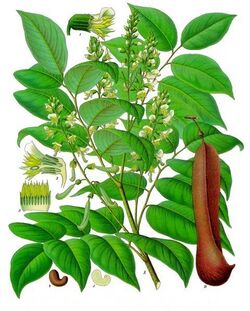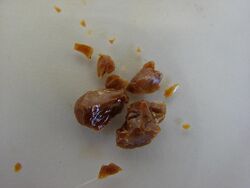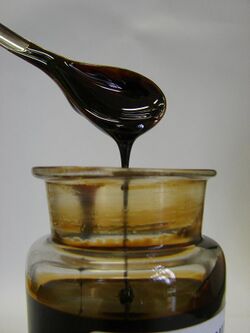Biology:Myroxylon balsamum
| Myroxylon balsamum | |
|---|---|

| |
| Tolu balsam tree Myroxylon balsamum var. balsamum | |

| |
| Peru balsam tree Myroxylon balsamum var. pereirae | |
| Scientific classification | |
| Kingdom: | Plantae |
| Clade: | Tracheophytes |
| Clade: | Angiosperms |
| Clade: | Eudicots |
| Clade: | Rosids |
| Order: | Fabales |
| Family: | Fabaceae |
| Subfamily: | Faboideae |
| Genus: | Myroxylon |
| Species: | M. balsamum
|
| Binomial name | |
| Myroxylon balsamum (L.) Harms
| |
| Synonyms | |
| |
Myroxylon balsamum, Santos mahogany, is a species of tree in the family Fabaceae. It is native to tropical forests from Southern Mexico through the Amazon regions of Peru and Brazil at elevations of 200–690 metres (660–2,260 ft).[2] Plants are found growing in well drained soil in evergreen humid forest.
Varieties
According to the Germplasm Resources Information Network, there are two varieties:[3]
- Myroxylon balsamum var. balsamum – Tolu balsam tree
- Myroxylon balsamum var. pereirae (Royle) Harms – Peru balsam tree
Description
The tree is large slow growing, reaching 45 metres (148 ft) in height. Crown is round with dense foliage and the bark is yellowish with a pungent odor. Leaves alternate, petiolate, 8–20 centimetres (3–8 in) including the petioles, the petioles 1–4 centimetres (1⁄2–1 1⁄2 in) long, and the rachis 5–15 centimetres (2–6 in) long. The rachis and petioles are pubescent and terete. Leaflets are acute to acuminate at the apex, obtuse at the base, glabrous, with an entire margin and glandular oil dots.
Plants bloom 5 years from seeds during the months of February to June. Flowers are white, pubescent and has around 10 stamens. The fruit is a flat winged pod, narrowly obovate 8 centimetres (3 1⁄4 in) long 1–2 centimetres (3⁄8–3⁄4 in) wide, yellow to brown when dried and drop around November to January.[4]
-
Trunk
-
Limbs
-
Leaves
-
Leaves
Uses


Balsam of Tolu and Balsam of Peru are the products of the species' resin. They are extracted from different varieties in different ways.[5][6] They are marketed among a series of intermediaries and exporters, their destinations being Germany, the United States of America, England and Spain, where they are used in the manufacture of cosmetics and medicines (for diseases of the skin, bronchi, lungs and airways, and in the treatment of burns and wounds).[7] The tree has been planted for Balsam production in West Africa, India , and Sri Lanka.
The wood is reddish and has interlocked grain, which gives it a strong ribbon-like pattern, and logs produce a large amount of knot-free lumber. The wood has a Janka hardness of 2,200 pounds-force (9,800 N) and is somewhat resistant to fungal decay. Myroxylon balsamum wood is used for flooring, furniture, interior trim, and heavy construction.[8]
M. balsamum is often used as a shade tree in coffee plantations.[4]
References
- ↑ Canteiro, C.; Lewis, G. (2021). "Myroxylon balsamum". IUCN Red List of Threatened Species 2021: e.T62026528A62026530. doi:10.2305/IUCN.UK.2021-2.RLTS.T62026528A62026530.en. https://www.iucnredlist.org/species/62026528/62026530. Retrieved 25 December 2022.
- ↑ Bagnatori, Ângela; Lewis, Gwilym P.; de Freitas, Vidal; Goulart, Ana Maria (2015). "A revision of the genus Myroxylon (Leguminosae: Papilionoideae)" (in en). Kew Bulletin 70 (4): 48. doi:10.1007/s12225-015-9604-7. ISSN 0075-5974.
- ↑ {{citation | mode = cs1 | title = Myroxylon balsamum | work = Germplasm Resources Information Network (GRIN) | url = | publisher = [[Organization:Agricultural Research ServAgricultural Research Service (ARS), United States Department of Agriculture (USDA) | access-date = }}
- ↑ 4.0 4.1 Vozzo, J.A.; United States. Forest Service (2002). Tropical Tree Seed Manual. Agriculture handbook. U.S. Department of Agriculture, Forest Service. p. 582-583. https://books.google.com/books?id=RolEyk_23WIC. Retrieved 2020-09-21.
- ↑ "Assessment report on Myroxylon balsamum (L.) Harms var. pereirae (Royle) Harms, balsamum". Committee on Herbal Medicinal Products (HMPC). 2016-05-31. https://www.ema.europa.eu/en/documents/herbal-report/final-assessment-report-myroxylon-balsamum-l-harms-var-pereirae-royle-harms-balsamum_en.pdf.
- ↑ Flückiger, Friedrich August; Hanbury, Daniel (1874). Pharmacographia: A History of the Principal Drugs of Vegetable Origin, Met with in Great Britain and British India. London: Macmillan and Co.. pp. 177–184. https://www.biodiversitylibrary.org/item/179477#page/201/mode/1up.
- ↑ Fuentes, R. E. (1993). "El Bálsamo en El Salvador: Una especie con potencial económico". Revista Forestal Centroamericana 6: 38–41. http://repositorio.bibliotecaorton.catie.ac.cr/handle/11554/6139..
- ↑ "Santos Mahogany - Lumber Identification (Hardwood)". 2010-04-14. https://www.wood-database.com/santos-mahogany/.
External links
Wikidata ☰ Q15290525 entry
 |






